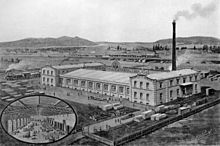Brothers angels
Coordinates: 48 ° 15 ′ 52.6 " N , 16 ° 24 ′ 44.9" E
The Engel Brothers was an imperial and royal court parquet factory and joinery in Vienna .
history
Stefan Barawitzka learned the carpentry trade in Vienna. In 1838 he founded his own company and was able to introduce significant improvements in the manufacture of parquet . His work soon earned him a great reputation, so that his products were exported to most European countries, to Egypt , etc. For the castle on the Hradschin , in the palais of the Archdukes Albrecht and Rainer in Vienna, in many private palaces and in castles, Barawitzka laid parquets that were in good condition even after 50 years.
In 1870 he sold his establishment, which was then located at Nussdorfer Straße 126 in Heiligenstadt , to a limited partnership . This set up the mechanical operation and enlarged the old factory with several additions. In 1873 the tiling was carried out by the then limited partnership in the Imperial Pavilion of the World Exhibition , for which the factory was awarded the Medal of Merit and the director was awarded the Golden Cross of Merit with the crown .
In 1884 this establishment passed into the possession of the Imperial and Royal Kommerzialrat Alexander Engel de Jánosi (August 8, 1852 in Pécs - May 27, 1940 ibid), a son of Adolph Engel de Jánosi , who undertook major restructuring and in 1885 the factory was replaced by the Extension of a machine-equipped joinery enlarged.
In the same year, Archduke Karl Ludwig honored the company with his visit, inspected all parts of it for 1.5 hours and spoke highly of the furnishings and the products of the factory.
The company was successful and by the turn of the century 1900 had carried out several major works. Among them was the parquet of the summer palace Hermesvilla of Empress Elisabeth in 1885, parquet of the imperial residence Achilleion in Corfu in 1890-1891, Mayerling Castle by Crown Prince Rudolf (1887), Schladming Castle by the Duke of Coburg (1885), major parquet work for the adaptation of the Palais des Archduke Rainer in Vienna and Gmünd (1894), parquet flooring and carpentry work in the palace of Prince Arnulf of Bavaria (1894–1896) as well as the large ballroom and adjoining rooms in the Vienna City Hall (1888).
In addition, a large number of stately palaces in Vienna and in the provinces were partly completely parquet floored, partly during adaptation work by the owners. These included the palaces of Prince Montenuovo , Prince Schwarzenberg , Prince Collalto , Count Trauttmansdorff , Count Cziráky, Count Károlyi , Count Ceskonics, Count Franz Esterházy , Moriz Esterházy, Margrave Pallavicini , Count Khevenhüller and many other high rulers. Work was also repeatedly delivered to Spain , India , Buenos Aires and America .
The owners built a new facility in Floridsdorf in the immediate vicinity of the train station, which was connected to the Kaiser Ferdinands-Nordbahn . Here, a site of over 25,000 m² was acquired on a plateau and a factory that met all requirements of the time was built on it. The main building was 1,250 m² in size, with a 500 m² hall and a second 200 m² hall. It consisted of a basement , ground floor and first floor and was equipped with excellent new woodworking machines, some from America, some from Austria and Germany .
In addition to the main wing, there were various outbuildings of around 1,100 m². A part of the railroad track (500 m²) was covered so that the workers could load and unload safely in bad weather.
Dedusting system , steam heating , electrical heating and other innovations were also available. Before 1900, the company was awarded the honor of parquet flooring a wing of the New Castle in Vienna and paneling of the ceremonial halls. The company used all its skills to fulfill this task to the satisfaction of the emperor.
The sole owner of the company, Alexander Engel de Jánosi, was a knight of the Franz Josef Order and owner of the Austro-Hungarian military jubilee medal, as well as six high foreign medals, which he partly as a committee member and juror at world exhibitions abroad, partly for his specialist work ( Medal for Art and Science) in the field of the timber industry and timber trade. He had been a member of the kk permanent commission for commercial values since 1889 and as such held the title of kk commercial council.
Individual evidence
- ↑ Brothers Angels . In: Presented by the industrialists of Austria under the high protectorate of His K. and K. Highness of the Most Serene Archduke Franz Ferdinand (Hrsg.): Die Groß-Industrie Oesterreichs . Festival ceremony for the glorious fiftieth anniversary of the reign of His Majesty the Emperor Franz Josef I. Volume 3 . Leopold Weiss, Vienna 1898, VII. Wood and carved ware industry; Home furnishings, p. 311 .
